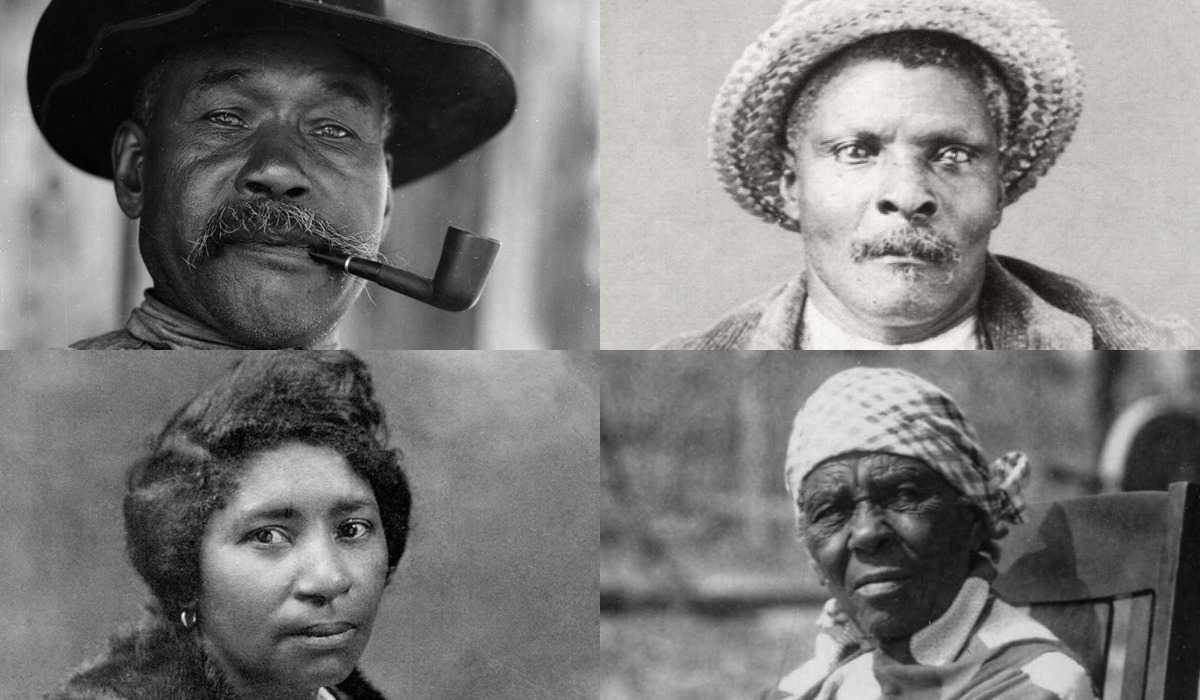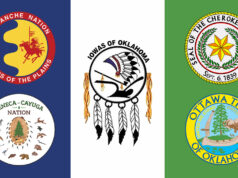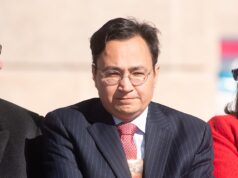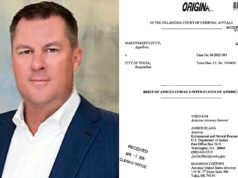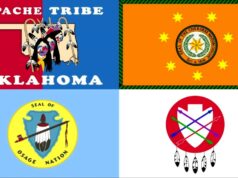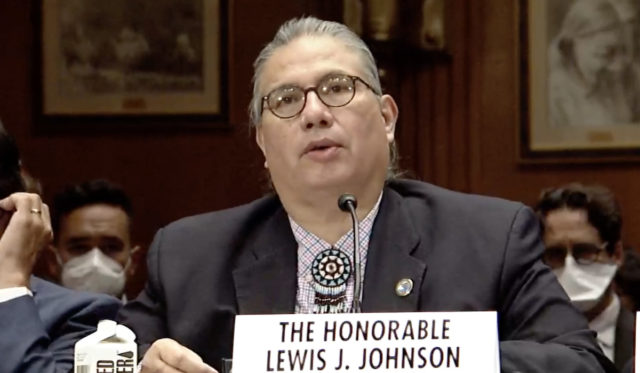
During a U.S. Senate Committee on Indian Affairs hearing this afternoon regarding the descendants of slaves formerly held by the Muscogee, Chickasaw, Choctaw, Seminole and Cherokee nations, representatives from four of the Five Tribes expressed consternation at the idea of federal intervention that would pressure the tribes to recognize Freedmen as full citizens who would be eligible for tribal benefits.
“After surviving the cruelty of the Trail of Tears, the Dawes Act, the near termination of our tribal functions, and nearly two centuries of takings at the hands of the United States government, the Choctaw Nation deserves better than to have the core of its constitutional identity as a sovereign tribe threatened,” testified Mike Burrage, general counsel of the Choctaw Nation.
The Senate committee invited the elected leaders of all Five Tribes to testify at Wednesday’s hearing, but only Cherokee Nation Principal Chief Chuck Hoskin Jr. and new Seminole Nation of Oklahoma Chief Lewis Johnson appeared Wednesday. (Seminole Assistant Chief Brian Thomas Palmer also spoke to the committee.)
Burrage testified instead of Choctaw Nation Chief Gary Batton, Chickasaw Nation general counsel Stephen Greetham testified for Gov. Bill Anoatubby, and Muscogee Nation Ambassador Jonodev Chaudhuri appeared on behalf of Chief David Hill.
Marilyn Vann, who is the first Freedman to hold a position in the Cherokee Nation’s government and is additionally the president of the Descendants of the Freedmen of the Five Civilized Tribes, testified on behalf of all Five Tribes’ Freedmen. The fact that no other Freedmen were invited to testify frustrated some advocates, as well as U.S. Rep. Maxine Waters (D-CA43).
“Can the tribes change without congressional and federal intervention? History says, ‘No,'” Vann said.
Vann was a plaintiff in Cherokee Nation v. Nash, which resulted in a 2017 U.S. District Court ruling that Freedmen are entitled to full citizenship rights in Cherokee Nation. After the ruling, the Cherokee Nation changed its constitution to explicitly include Freedmen as full citizens of the tribe.
“Currently only (the) Cherokee Nation works to fulfill its treaty obligations to the Freedmen,” Vann testified. “As a result of past and current systemic racism, descendants need the help of the senators.”
Cherokee Nation stands out on Freedmen issue
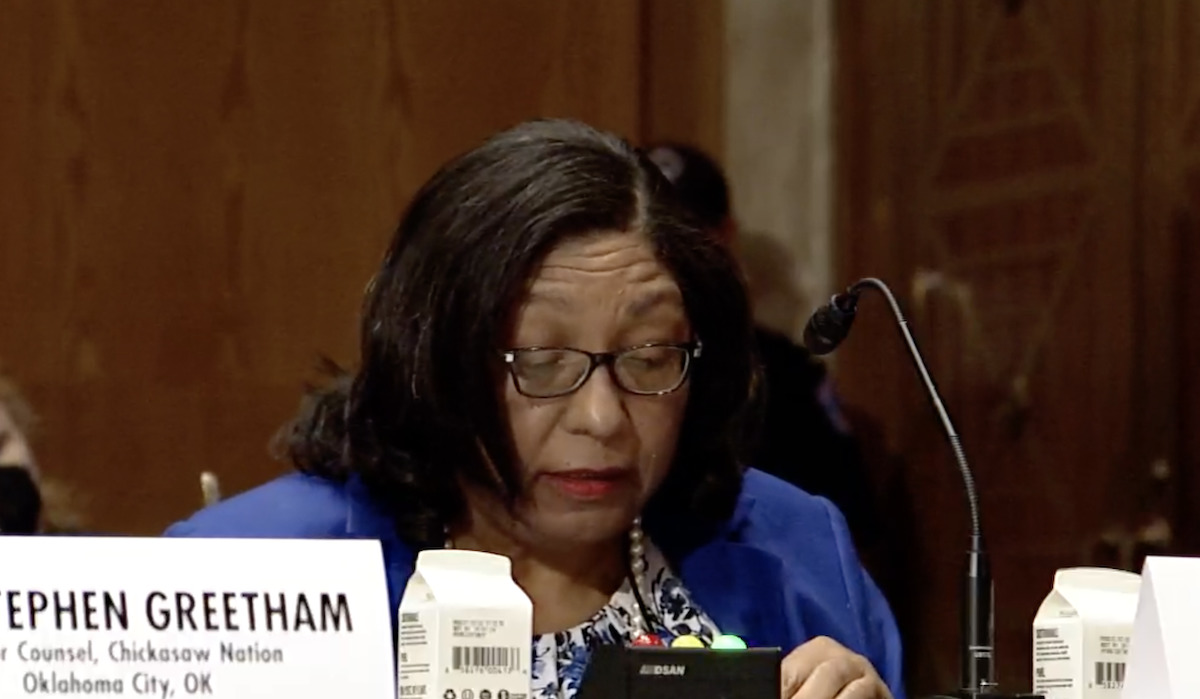
In 1866, a year after the Civil War concluded, the United States entered into treaties, known now as the Reconstruction Treaties, with each of the Five Tribes. The treaties created reservations — which were recently affirmed by the U.S. Supreme Court — and they also required that the tribes free their slaves and enroll them as citizens. However, the Cherokee, Seminole, Muscogee and Choctaw later amended their constitutions to exclude Freedmen from membership, and the Chickasaw did not acknowledge granting Freedmen citizenship at all.
Now, with only the Cherokee Nation providing its Freedmen the benefits of citizenship, the topic of how tribes treat their Freedmen has drawn additional attention and scrutiny from activists and Waters, who is pushing legislation that would tie federal funding for tribal housing and infrastructure to compliance with the 1866 treaties.
Cherokee Nation Principal Chief Chuck Hoskin Jr. testified on Wednesday that the inclusion of Freedmen has made the Cherokee a “better, stronger tribe.”
“Our ancestors agreed in 1866 to forever cede the right to exclude Freedmen and their descendants,” Hoskin said. “The enslavement of other human beings, and the subsequent denial to them and their descendants of their basic rights, is a stain on the Cherokee Nation. It’s a stain that must be lifted.”
Seminole Nation of Oklahoma Chief Lewis Johnson argued that the United States never upheld its end of the 1866 treaty, voiding the agreement.
“The Seminole [were] the only tribal nation of the Reconstruction Treaty era forced to cede every inch of their land,” Johnson testified. “The Seminole understood the 2,169,000 acres ceded was to be assigned to other Indians and Freedmen to live on their own. This promise was neither fulfilled nor honored.”
Other tribal representatives insisted that determining who is and is not a citizen of a tribe should remain squarely with each tribe’s leadership, without any interference from the federal government.
Seminole Nation Assistant Chief Brian Thomas Palmer testified that the promises made to the Freedmen in 1866 were coerced by the federal government.
“Weighted consideration must be given to the government’s chosen language and intent, and the atmosphere in which [the treaty] was constructed 156 years ago,” Palmer said. “Phrases and terms utilized within the treaty are not the words of the Seminole. They’re the words and desires of the federal government.”
Burrage, a prominent attorney with a variety of powerful clients, testified as general counsel to the Choctaw Nation. In May 2021, Chief Gary Batton published an open letter on his blog saying his administration would have “meaningful conversation” regarding the concept of offering citizenship for Choctaw Freedmen.
But on Wednesday, Burrage cited the Choctaw Nation’s constitution, which received federal approval in 1983, as limiting citizenship to only those who are Choctaw by blood.
“But now another part of the federal government that approved that constitution wants to unilaterally walk it back without the consent of the individuals affected and without consent of the tribe,” Burrage said. “Does that sound familiar to you?”
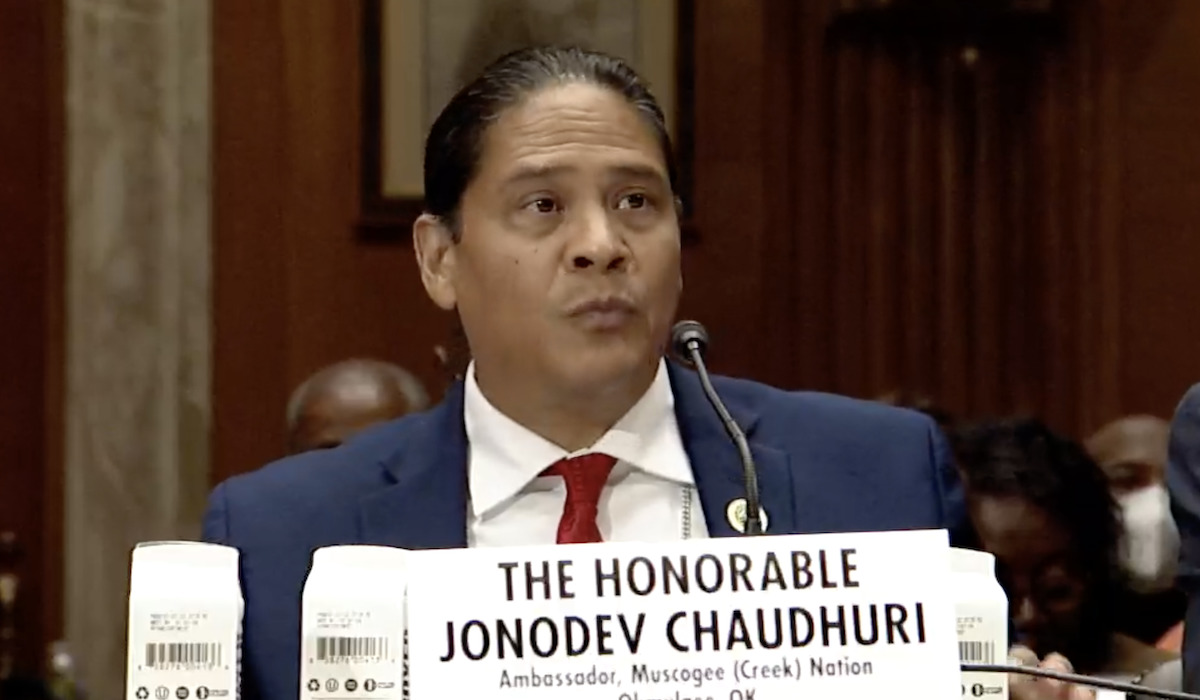
Jonodev Chaudhuri, ambassador to the Muscogee (Creek) Nation, testified that the federal government becoming involved on behalf of Freedmen descendants threatens tribal sovereignty. He said creating internal processes within the tribes to better educate members on the Freedmen’s status would be a better alternative.
“To that end, we’ve begun a process at Muscogee Creek Nation developing historical, cultural and legal research that will help our citizens engage in a thoughtful, informed exploration of this issue, as they exercise their sovereign right to determine the future,” Chaudhuri said. “As a nation that has endured policies intended to exterminate us because we’re Creek Indians by blood, citizenship and issues involving non-Creek persons engender deep, conflicting emotions.
“Quite frankly, our citizens stand on both sides of these issues. We’re working towards healing.”
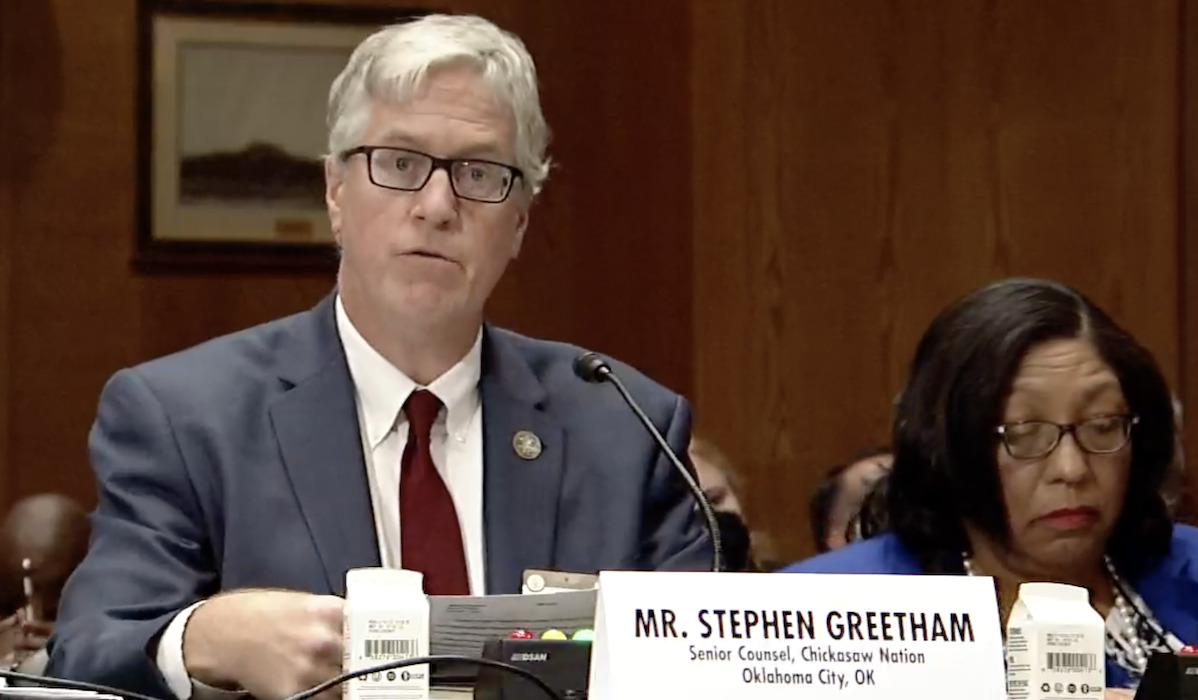
Chickasaw Nation general counsel Stephen Greetham cited a 1902 decree from the Court of Claims which he said established that the Chickasaw 1866 treaty did not obligate the Chickasaw to make Freedmen citizens.
“Instead, the treaty provided for potential citizenship, as the Court of Claims put it, ‘a means whereby Freedmen might, by consent of the tribe and the voluntary action of former slaves, become members,'” Greetham said. “Treaties matter. They’re the supreme law of the land. The federal legal system both produced the Chickasaw Nation’s 1866 treaty and adjudicated its meaning more than a century ago.”
Lankford: ‘How do we get to a resolution?’
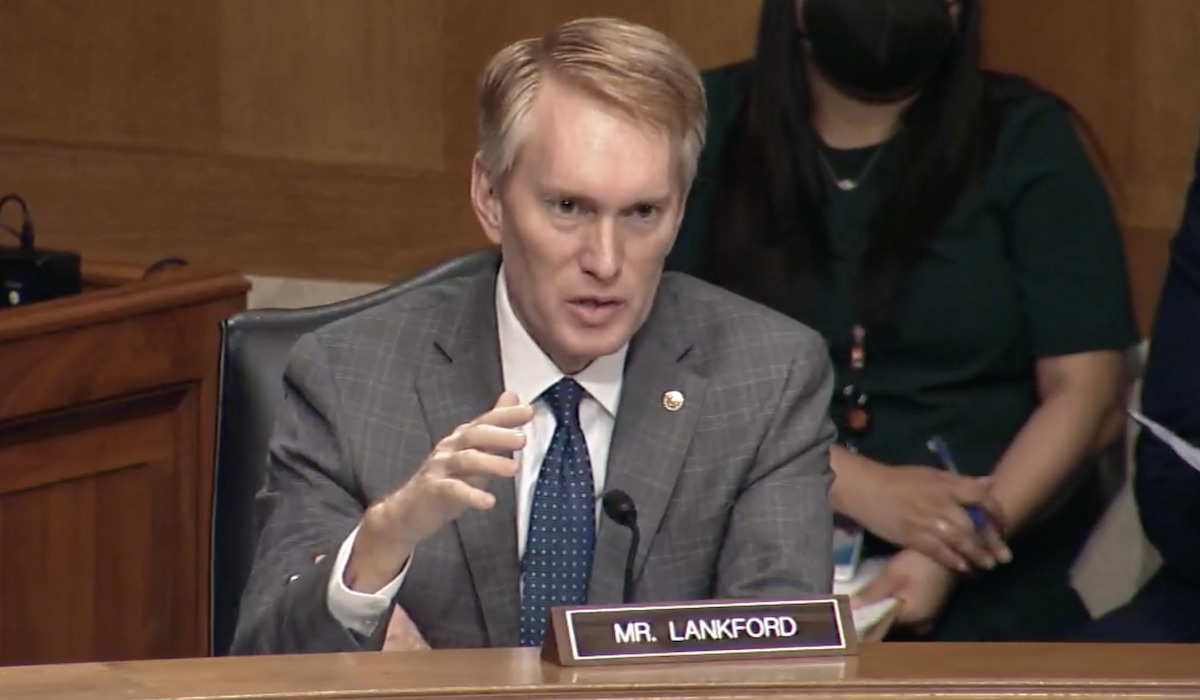
In her testimony, Vann stressed that Freedmen descendants currently suffer as a result of exclusion from tribal citizenship, and she cited health and housing programs as particular services that would benefit Freedmen.
“The Muscogee Creek Nation stresses the validity of Article Three of the 1866 treaty, which confirmed their reservation — see McGirt v. Oklahoma — but is silent on Article Two of the same treaty, that freed the enslaved people and gave their descendants the right to share in the national funds and all the rights of the Indians,” Vann said. “Since February 2021, the Creek Nation issued $4,500 checks from COVID-19 funds to each by-blood citizen. Not a nickel went to the Freedmen, a clear violation of that treaty.”
Sen. James Lankford (R-Oklahoma), a member of the Committee on Indian Affairs, said he has known Vann for 11 years, meeting first when Vann “chased him down and cornered him” in a public library to discuss the Freedmen’s situation.
“How do we get to a resolution, so it is not another century from now and this same kind of hearing is still occurring?” Lankford asked rhetorically of the hearing’s witnesses. “Many of you reference, ‘These are resolved issues within our tribe. It’s been resolved in law, it’s been resolved through different treaties, it’s been resolved in different arrangements,’ but it’s clearly unresolved.”
The chairman of the committee, Sen. Brian Schatz (D-Hawaii), admitted at the end of the hearing that “most people will leave unsatisfied, not vindicated.”
RELATED
The long fight for Freedmen citizenship continues in Oklahoma tribal nations by Joe Tomlinson
“But I consider this a success, because we aired it out, and people were heard,” Schatz said. “We want to make sure that sovereignty is respected. But we also want to understand that African-American enslaved people and Native Americans were mistreated, and we are all in this situation because of the actions of the federal government of the United States.”
Waters, who spearheaded a similar House committee hearing on the topic exactly one year prior, praised Vann’s advocacy for Freedmen but expressed frustration about the limited number of voices heard Wednesday.
“I must indicate that even though there appears to be only one representative here for the Freedman, I would like — if at all possible — to make sure that the voices of other Freedman are heard, in some sense, in some way,” Waters said. “While I’m pleased that the United States Senate is finally hearing testimony from a Freedman descendant, I must say that hearing from more voices, not less, is the key to productive dialogue. It is when we don’t expand our table to hear more from those who have been disenfranchised that injustices and systemic inequities have perpetuated.”
Schatz said a report through the Governmental Accountability Office would likely be the committee’s next step to continue investigating how to proceed with the issue of Freedmen citizenship.









